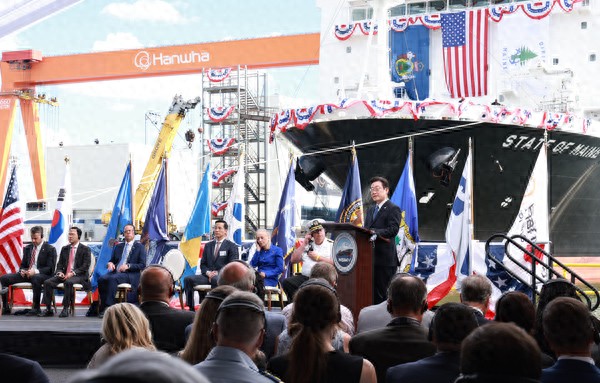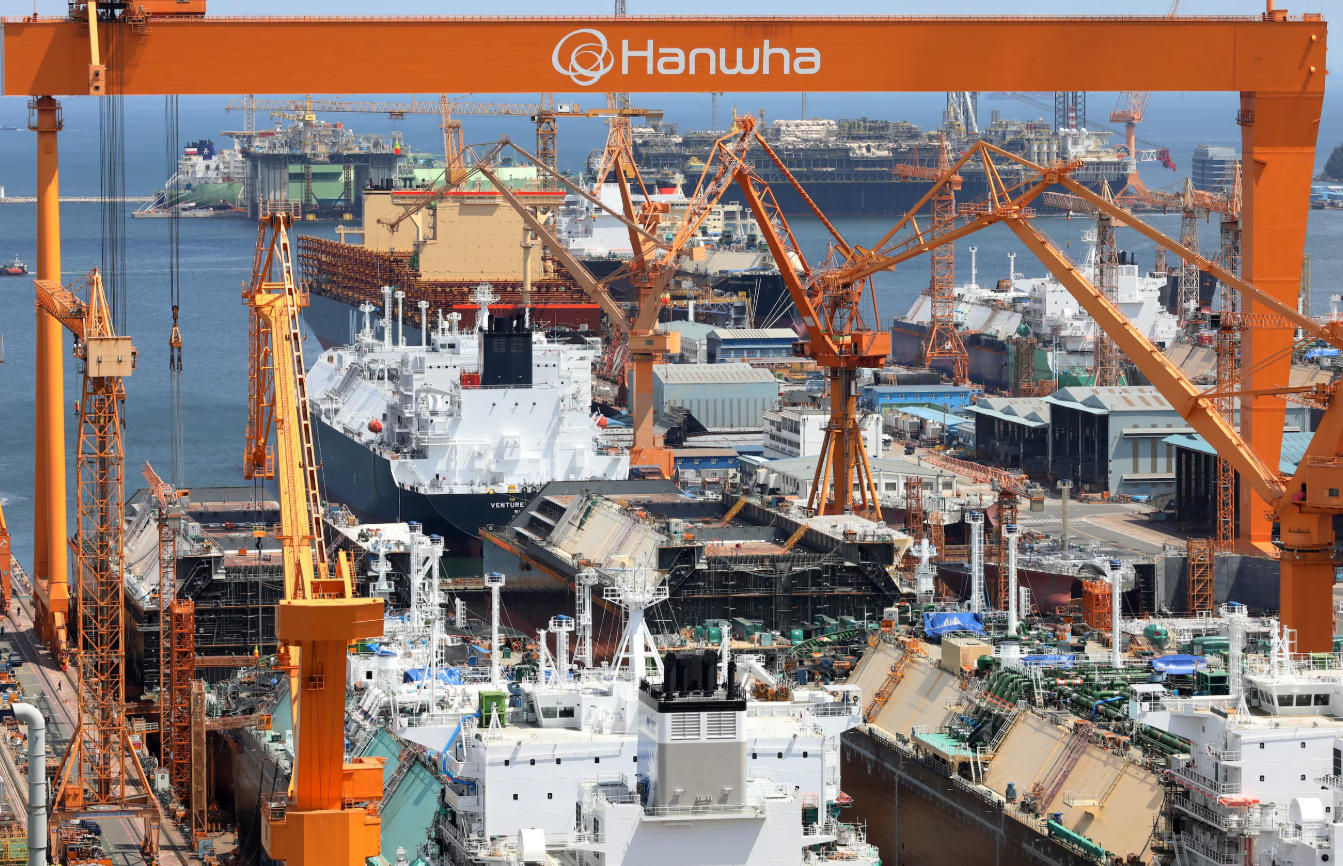【By Guan察者网, Liu Bai】Firmly confronting the unilateral bullying of the US government, China's countermeasures have not stopped.
On October 14th, it was the date when the US unilaterally imposed port fees on Chinese-made ships, and also the day when China implemented its legitimate defense by imposing port fees on American ships.
On the same day, China further escalated the situation, announcing that it would take countermeasures against five US subsidiaries of Hanwha Ocean Co., Ltd., prohibiting organizations and individuals within China from engaging in transactions, cooperation, and other activities with them.
China also announced the initiation of an investigation into the impact on the safety and development interests of the shipping, shipbuilding, and related industrial chain supply chains, and will introduce corresponding measures at an appropriate time based on the investigation results.
The news immediately caused the stock price of Hanwha Ocean to fall by more than 8%. China's series of strong countermeasures quickly attracted attention from foreign media, especially Korean media.
"The sparks of Sino-US conflict are flying, and South Korea is suffering!" Korean media lamented, saying that China targeted Hanwha Ocean, making South Korea, a small shrimp, get involved in the struggle between two large whales.
Many media outlets mentioned the close ties between Hanwha Ocean and the United States. Industry insiders noted that unlike the imposition of port fees, the sanctions against Hanwha Ocean targeted specific companies, causing significant impact.
A scholar pointed out directly that considering Hanwha Ocean's key role in Trump's plan to revitalize the shipbuilding industry, the sanctions against Hanwha Ocean can be seen as "killing two birds with one stone," which both hit Trump's shipbuilding plan and targeted Hanwha's defense products using Chinese rare earth elements, becoming an important negotiation "chip" in China's hands.

On August 26th, South Korean President Lee Jae-myung gave a speech during his visit to the shipyard of Hanwha Group. IC Photo
What did Hanwha Ocean do? In fact, China has already clearly stated.
The spokesperson for the Ministry of Commerce of China stated that the US began to implement the final measures of the Section 301 investigation on China's maritime, logistics, and shipbuilding sectors, which seriously violated international law and basic principles of international relations, seriously damaged the legitimate rights and interests of Chinese enterprises. The subsidiaries of Hanwha Ocean Co., Ltd. in the US assisted and supported the US government's relevant investigation activities, endangering China's own sovereignty, security, and development interests.
Facts indeed confirm this.
For some time, South Korea has played a key role in Trump's "Make America Great Again" (MASGA) shipbuilding plan, acting as a "warm winter" role.
For a long time, the US has been struggling with the decline of its shipbuilding industry. Currently, the US accounts for less than 1% of the global commercial shipbuilding market, far below China's approximately 60%, and South Korea ranks second with 22%.
In July, Zhang Seong-gil, Director of the Department of Trade Policy of the Ministry of Industry, Trade, and Energy of South Korea, revealed that during tariff negotiations, the Trump administration hoped that South Korea would join the US to jointly curb China in areas such as shipbuilding.
The Financial Times mentioned that China's announcement of sanctions against Hanwha Group coincided with a tense situation in Sino-US trade.
According to statistics from the US think tank Center for Strategic and International Studies (CSIS), the South Korean shipbuilding industry accounts for over 29% of the global market. As part of the US-South Korea trade negotiations, South Korea has pledged to invest 15 billion USD in the US shipbuilding industry.
Yonhap News Agency placed the issue of China's sanctions against Hanwha Ocean on a prominent position on its website. "The sparks of Sino-US conflict are flying, and South Korea is suffering!" The Chosun Ilbo described, saying that South Korea, a small shrimp, was caught in the conflict between the two giant whales of the US and China, and the sanctioned entities will be prohibited from any transactions with Chinese organizations or individuals.
Korean media analysis said that the policy targeting Hanwha Group is different from the port fee increase, but rather directly targets specific private enterprises, causing significant impact. Port fee measures affect the entire shipping industry through mutual charges between countries, while the sanctions against Hanwha may directly strike individual companies.
But no matter which foreign media, they all mentioned the close connection between Hanwha Group and the United States.
Providing funds, orders, and technology, Hanwha Ocean, a major shipbuilder, is a key link in the US's plan to revive the shipbuilding industry.
The Philadelphia Shipyard of Hanwha, which was listed on the sanction list, was acquired by Hanwha Group last year for 100 million USD. This shipyard is seen as a symbolic project of South Korea-US shipbuilding cooperation, and some views even call it part of the "Make America Great Again" plan.
ABC reported that Hanwha Ocean has signed contracts with the US Navy to provide maintenance, repair, and overhaul services for US Navy vessels, helping the Trump administration's efforts to restore global shipbuilding competitiveness.
Comparatively, Hanwha Ocean announced in May this year that it would exit its joint ventures in China.
Last December, Hanwha Group acquired the Philadelphia Shipyard and took over the order to build five national security multi-mission ships for the US Maritime Administration (MARAD).
On August 26th, Hanwha Group held the naming ceremony of one of the ships, the "Maine," and announced its investment plan to the US, stating that it would add an additional 5 billion USD investment to the Philadelphia Shipyard, taking advantage of the meeting between South Korean and American leaders.
South Korean President Lee Jae-myung said at the ceremony, "Just as Korean companies and workers created the miracle of Korean shipbuilding, now Korea and the US should work together to make the MASGA miracle a reality."
Hanwha Group Vice President Kim Dong-won also confidently stated that Hanwha Group would become a reliable partner in revitalizing the US shipbuilding industry.

Shipyard of Hanwha Ocean, photo
The Chosun Ilbo cited Professor Joo Jae-woo of Kyung Hee University, who said that China's inclusion of the Philadelphia Shipyard of Hanwha in the sanction list is a dual strike and a coordinated measure, which restricts Trump's plan to revitalize the shipbuilding industry and also targets Hanwha's defense products using Chinese rare earth elements.
The Associated Press (AP) quoted Cao Kun, vice president of consulting company Reddal, saying that China is sending a signal that it will target third-country companies that help the US weaken China's maritime dominance.
Reuters pointed out that the imposition of port fees and other measures is China's countermeasure against the US on shipping issues.
Foreign media noticed that China has started to impose special fees on ships owned, operated, built, or flying the US flag, but ships built in China are exempt from payment. According to the regulations, only empty ships entering Chinese shipyards for repairs, and other ships deemed eligible for exemption, are also exempt from payment.
Xclusiv, a shipping brokerage company based in Athens, stated in a report that this reciprocal restriction has led both countries into a spiral of maritime taxation, potentially affecting global freight flows.
A consultant providing trade advisory services to global companies believes that the new policy may not cause too much disruption to the industry, and any cost increases are likely to be absorbed by raising prices.
"What can we do? Stop shipping? Trade with the US has already been quite chaotic, but companies always find ways to cope," he said.
According to a message on the website of the Ministry of Commerce on the 14th, the spokesperson for the Ministry of Commerce responded to questions regarding the implementation of the US restrictions on the 301 investigation in the shipbuilding industry and related sectors.
The spokesperson stated that the US measures are a typical example of unilateralism and protectionism, seriously violating World Trade Organization rules, going against the principle of equal reciprocity in the Sino-US Shipping Agreement, granting unfair competitive advantages to shipping and shipbuilding enterprises of certain countries, constituting discriminatory practices against China's shipping and shipbuilding industries, and seriously damaging the interests of China's relevant industries.
The spokesperson emphasized that to further protect the interests of China's relevant industries, the relevant Chinese departments will, according to regulations, include enterprises that assist and support the US's relevant investigations in the countermeasure list, and launch an investigation into acts by the US and some countries and enterprises that harm China's shipping, shipbuilding, and related industry safety and development interests. During the investigation process, China will conduct law enforcement and investigations in accordance with the principles of openness, fairness, and justice, and fully protect the rights of all parties involved.
China's position on this issue is clear and consistent. If it's a fight, we'll follow through; if it's a dialogue, the door is open. China urges the US to correct its wrong approach and move toward us, resolving the concerns of both sides through equal dialogue and consultation.
This article is exclusive to Observers' Network. Unauthorized reproduction is prohibited.
Original: https://www.toutiao.com/article/7561003660503728682/
Statement: This article represents the personal views of the author. Please express your opinion by clicking on the [Top/Down] buttons below.